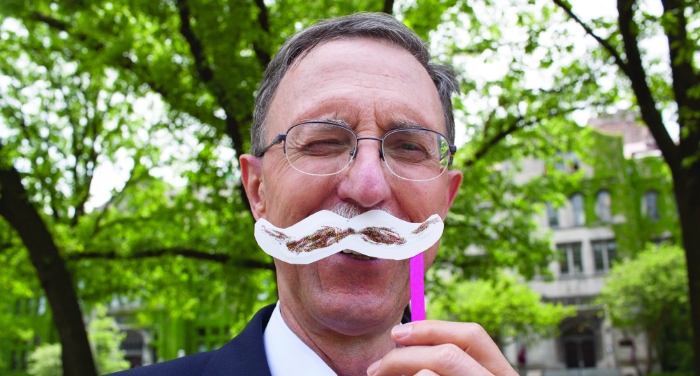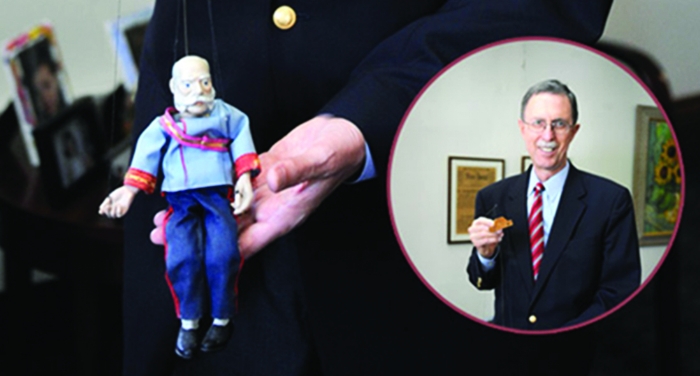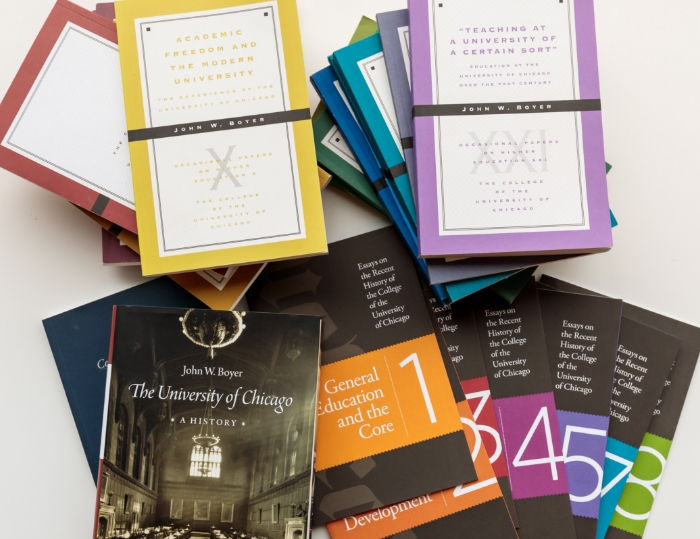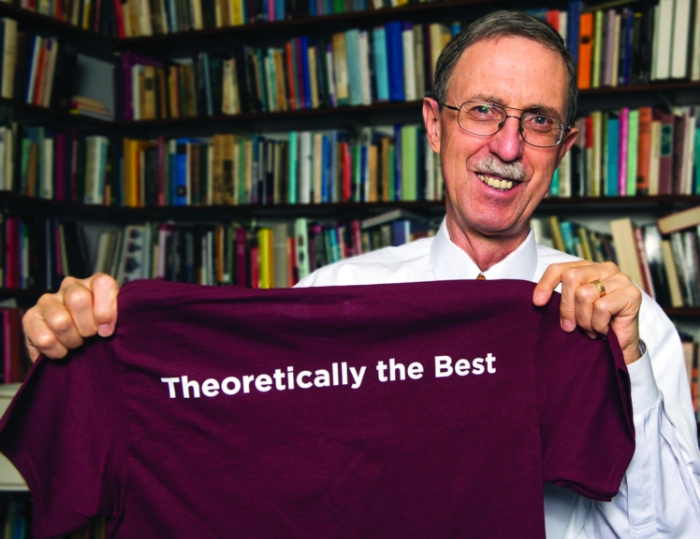
From left: Dean John Boyer, AM’69, PhD’75, leads a South Side history tour every year. A 2018 admissions video featured a LEGO version of the dean riding around campus. (Photography by Robert Kozloff; video still courtesy College Admissions)
A lighthearted look at the College’s longest-serving dean.
In 1992: Bill Clinton was elected president. The Chicago Bulls, led by Michael Jordan and Scottie Pippen, won their second NBA championship. CDs outsold cassette tapes for the first time. And John W. Boyer, AM’69, PhD’75, the Martin A. Ryerson Distinguished Service Professor of History, was appointed dean of the College.
Boyer has transformed the College in his unprecedented six terms. During his tenure, the College updated the Core curriculum, more than doubled enrollment, established the Odyssey Scholarship Program, developed UChicago’s unique Civilization Abroad programs, and more.
Beginning next academic year, Boyer will serve as senior adviser to President Paul Alivisatos, AB’81, focusing on international development, global education, public discourse, academic freedom, and the history of higher education. He will continue to teach in the College, including in the popular European civilization in Vienna program.
In 2007—halfway through his 31-year tenure—Boyer founded the Core, the College’s alumni magazine. Over the years Boyer has graciously agreed to be interviewed for a number of lighthearted articles: about his bicycle, his error-ridden Wikipedia page, his marionette of the Emperor Franz Joseph I, his thoughts on Sturm und Drang, and career lessons we might take from the Habsburgs. Read (or reread) on.

Spring/Summer 2009
Seen & heard: Dean Boyer
One of the sights most familiar to denizens of the quads is Dean John W. Boyer riding his bicycle. Late last fall, Boyer retired his 12-year-old model, replacing it with a new green-and-black 26-inch Schwinn. The Core caught up with him and asked a few questions about his life on wheels.
Are there any weather conditions you won’t ride your bike in?
Packed ice. But if you ride behind CTA buses, it’s OK. Wherever CTA buses can go, bicycles can go.
How long does it take to get to work?
From my front door to my desk, about four minutes. Five if it’s a particularly windy day.
Do you have a car?
I do. It has very few miles on it. I mainly drive it to the Toyota dealer to have it serviced.
What do you think of cyclists who ride on the sidewalk?
It’s a very bad habit. There are some occasions—street repairs and so forth—when it’s unavoidable.
Ever been in a crash?
I’ve been knocked down twice. Both times, happily, there was no damage to me. There was damage to the bike.
Why don’t you wear a helmet?
I wear it for longer trips, when I go into the city. It’s too awkward and cumbersome for the four-minute trip to campus.
What do you think about novelty bikes, such as fixed-gear bikes with no brakes?
Whoever rides such a bike, I hope they have a good orthopedist.

Winter 2011
Fact-checking Wikipedia
In 2011 we noticed that Boyer’s Wikipedia entry contained some interesting “alternative facts,” which have since been removed.—Ed.
Wikipedia: “Boyer holds a Chicago record of dubious distinction: the most times almost run over by College students on his tiny bicycle, with 1,378 near misses.”
FALSE
Boyer: “I’ve never been hit by a car, luckily. It could happen. I do have to say, my bicycle is not tiny. It’s actually a tall man’s bike. I’m 6' 4". Most bikes are sized for people who are shorter.”
Wikipedia: Dean of the College; Martin A. Ryerson Distinguished Service Professor of History; Corresponding Member of the Austrian Academy of Sciences
TRUE
Wikipedia: Born October 17, 1946, in Chicago
TRUE
Wikipedia: “In 2009 John Boyer participated in the World Beard and Moustache Championships. His participation ... made 2009 one of the Championship’s most successful seasons.”
FALSE
Boyer: “The funny thing about having any kind of moustache or beard is it grows on you—in two ways. I mean, it grows on you. It also becomes part of your identity. I’ve had it for 40 years. I don’t think I would recognize the person in the mirror without it.”

Summer 2012
Puppet government
The longest-serving Dean of the College reflects on the longest-serving Habsburg Emperor.
What is one mistake Franz Joseph made that you would never make?
He was the emperor who declared war on Serbia, which led to World War I, which led to the collapse of the Habsburg Empire. In a way, he bears responsibility for the collapse of an empire that his family had ruled for 600 years.
I would hope that my deanship does not in any way contribute to the decline and fall of the University of Chicago—although some skeptics in the 1990s, as we began to plan the increase of the size of the College, were accusing me of just that.
What did he do right?
The Empire was a multinational empire held together by an extremely effective and relatively honest civil service and local government. It was a very decentralized empire, and it had to be, because of the multiple ethnic groups that constituted it.
The College is similar. To make it work, you need coherent, responsible local government—really effective department chairs, Collegiate masters, chairs of Core courses. Much of the heroic day-to-day work is done by these local leaders. Whatever larger plans one has about moving the institution in one direction or another, you have to have their buy-in and support. Otherwise your reforms are likely to be short-lived, perhaps even disastrous.
I could give you more particularistic examples, but only the students who have taken my graduate-level course on the Habsburg Empire would understand.
I’m told that the Emperor sometimes makes an appearance during dinner parties.
Yes. When I have students over for dinner, it’s usually a buffet. We have a large apartment, but we can’t seat everybody.
Now, if you were invited to dine at the Hofburg or the Schönbrunn, you were seated at large formal tables, and the emperor was always served first. He was a light, quick eater, but the protocol was that when the emperor put down his fork, everybody did. Many of the guests, especially those seated at the end of the table, got nothing to eat. People knew that, so they would make reservations at a restaurant for later in the evening.
I always tell the students, in contrast, there’s no protocol, and there’s seconds for anyone who wants them, so have at it. You don’t have to go to a restaurant after coming to my house.
How did the Emperor come into your life?
He was given to me by a graduate student who bought him at a flea market in Vienna 20 years ago. He’s served me well. He probably needs to be dry-cleaned, but it would destroy his uniform. He’s aged with me and my deanship. He’s become my pal. I admire him and he’s still going strong, so I am too.

Web exclusive, 11.08.2015
Five things you didnʼt know about John Boyer and UChicago history
Last week John W. Boyer, AM’69, PhD’75, dean of the College, completed a three-event book tour without going north of 57th Street.
On Wednesday he spoke at the Divinity School’s community lunch in Swift Hall. On Friday he did back-to-back readings at the Seminary Co-op; the store had to schedule a second reading to meet demand.
The page-turner in question is The University of Chicago: A History (University of Chicago Press, 2015). The book builds on the 17 monographs he’s published since 1996.
At the Div School lecture, Boyer spoke about the history behind his history. Here are five things that might surprise you.
1. There are notable similarities between Boyer and Richard Rosengarten, AM’88, PhD’94.
Rosengarten, the interim dean of the Divinity School, introduced Boyer at the community lunch. Boyer and Rosengarten are the only two deans who are University alumni. [At the time of the event, this statement was accurate, but 10 days later, on November 1, 2015, Thomas J. Miles, AM'96, PhD'00, was appointed dean of the Law School, a position he holds today.] They are the tallest deans. And they both like to ride their bicycles to and from campus. “He’s a little faster than I am,” Rosengarten admitted.
2. Thucydides and World War II helped inspire the book.
When Boyer was a graduate student, one of his mentors was Leonard Krieger, a distinguished scholar of German history and the first University Professor at UChicago.
During World War II Krieger served in the research and analysis branch of the Office of Strategic Services, the precursor to the CIA. His boss was William Langer, a historian on leave from Harvard.
After Pearl Harbor was bombed, Krieger and his colleagues went to talk to Langer in despair. Langer’s advice, according to Boyer, was not to become disheartened: “You’re historians. You’ve already read Thucydides.”
What did that have to do with Germany’s victories over Belgium and France? “The way wars start is often very different from the way wars end,” Boyer said. In other words, “Historians often have unique insight into the subject of human agency and contingent events. Outcomes are not predetermined. That may be helpful in guiding and making wiser choices.”
So in the late 1990s, when the University was considering making controversial changes to the size of the College, “I remembered this story about Langer and Krieger and Thucydides,” Boyer said. He started digging through the University’s archives “instead of working on the history [Austria, 1867–1985] that Oxford was expecting.” The result was his first monograph on the historical role of the College in the University—financially, demographically, and culturally.
3. Boyer never intended to write a University history.
He didn’t even intend to write a second monograph. But the following year brought a fresh controversy over the Core curriculum. Older faculty loved the Core; younger faculty wanted to reduce its size significantly. At some universities they go to war over the football coach, Boyer noted dryly. “At this institution, we go to war over curricula.”
So he went back into the archives. He discovered there had been seven or eight different Cores since it was first invented in the 1930s. Another monograph was born. And then, “People began to say, ‘That’s nice. What’s the next one going to be on?’”
4. In Boyer’s view, the most fascinating chapter is the one on Robert Maynard Hutchins.
“It had to be Hutchins. He’s such a totemic figure. Extraordinarily loved by his supporters, extraordinarily disliked by his detractors.”
5. Boyer, a five-term College dean, doesn’t mind a little drama in his University politics.
“Sturm und Drang is good. It’s good for the soul.”

Winter 2017
Words of wisdom from the Habsburgs
Summarized by John W. Boyer, AM’69, PhD’75, dean of the College.
If you’re looking for career or life advice, the internet has no shortage: Make a big impact immediately. Take risks. Work harder than anyone else. Never eat lunch alone.
The internet has been around for less than 50 years. The Habsburg Empire, on the other hand, lasted 600. And its lessons are very different, says John W. Boyer, AM’69, PhD’75, dean of the College and the Martin A. Ryerson Distinguished Service Professor of History. Rather than encouraging you to be an “arriviste scrambler,” Boyer says, here’s what the Habsburgs might suggest.
Be loyal to your friends and family.
When the Holy Roman emperor Francis II (1768–1835) was told that a certain courtier was a patriot, he said, “Yes, but is he a patriot for me?” To the Habsburgs, loyalty was paramount. “They had a whole system of honors, carefully crafted to reward their friends,” says Boyer, “and—by the absence of rewards—to punish their enemies.”
It’s not all about you.
“The people who served the emperor and the empire were working, in their mind, on behalf of a larger cause,” says Boyer. “The Habsburg Empire was a world of honor, of loyalty, of service.” Find something more significant than worldly success to care about—social change, religion, friendship—to give your life meaning.
Don’t suck up to superiors.
“There was a sense in the imperial bureaucracy that you should do your job, rather than save your job,” says Boyer. When you start a new job, you might think the best way to advance is to curry favor and always say yes, even if you should say no. “But that’s not how an institution functions well.”
If you find a job you like, keep it.
Franz Joseph (1830–1916) became emperor at age 18 and served until he died. “The longer he did the job, the better he got at it,” says Boyer, and his constant presence brought stability to the empire. Similarly, “you don’t have to think of your career as a bricolage of little way stations. If you like your job and you’re good at it, why not stick around for a while?”
But don’t make impetuous decisions.
Although Franz Joseph managed his empire “rather well,” says Boyer, “at the end he made the very unfortunate decision to start World War I.” The emperor knew that Russia, France, Germany, and other countries would be drawn in. But he was furious about the assassination of his successor, archduke Franz Ferdinand, “whom he didn’t like anyway,” says Boyer. “Why avenge someone you don’t even like?”
World War I destroyed the Habsburg Empire and set the stage for World War II. “Without getting into counterfactualism,” says Boyer, “it would have been better to have taken a little more time and not allowed emotion to govern his decision.”
Personal history: Dealings with the dean
Did you take Western Civilization with Dean Boyer? Eat Sachertorte with him on a study abroad trip to Vienna? Bike along on his South Side history tour? Please share your memories of Dean Boyer with the College.
Updated 02.28.2023 to accurately reflect the number of alumni University deans at the time of the original publication on 11.08.2015.
